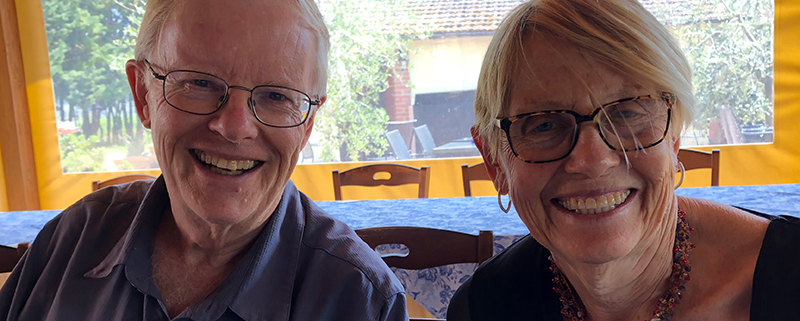by Lisa McIntosh
While David Preston says a long pastoral vacancy is ‘not something to be welcomed’ by a congregation, he knows it can bring the talents and commitment of its members to the fore.
David is the secretary of St Pauls Lutheran Church Wellington in New Zealand, which has been without a permanent ordained shepherd since Pastor Jim Pietsch left there in August 2022. However, as Pastor Jim was on sick leave before his departure, the congregation has essentially been without a pastor for almost a year.
‘During this period the lay members of the congregation have had to step up and cover the provision of services and other duties usually carried out by pastors’, David explains. ‘Fortunately, we have a number of members willing to act as lay worship leaders. A distinctive feature of this period has been the contribution of women as well as men as lay worship leaders, which has been well received by the congregation. We have also had services conducted by some visiting pastors.’ With lay-led worship, David says St Pauls usually splits the service into two main parts – the liturgy and sermon, with one person acting as liturgist, and the other reading the sermon.
For this, he says they have made ‘significant use’ of the LCANZ’s Worship Planning Page of sermons and other worship resources.
David himself is a lay worship leader and, with his wife Alison, hosts the congregation’s home group each Tuesday night and serves as a Sunday school teacher. His role as the secretary also involves dealing with congregational correspondence, minutes of meetings, facilities bookings and a range of other tasks.
Outside of the congregation, David is a member of the LCNZ Financial Advisory Committee and is the Lutheran representative on the NZ interdenominational InterChurch Bureau, dealing with legal and financial issues affecting all churches, such as the new laws and regulations on accounting, auditing, taxation, charities and insurance, and also other issues such as health and safety and abuse in care.
What do they say? ‘If you want something done, ask a busy person …’
However, David says, the effort put in to keep the worship life going at St Pauls is a team one.
‘Ministry work, including lay worship leadership, is spread amongst a number of people’, he says. ‘Several including myself are essentially retired, but others are working part-time or even full-time.’
Two St Pauls members have also been authorised by New Zealand Bishop Mark Whitfield to administer communion during services. ‘We have also been blessed by the continuing contribution of a number of talented musicians’, David adds.
Bishop Mark, who during his service as LCNZ Bishop has been based in Wellington, has also occasionally led worship at St Pauls.
While some LCANZ congregations which don’t have a pastor are no longer looking to call one full-time due to their financial limitations, St Pauls is seeking to call a pastor but so far has found this difficult.
David says given the significant number of vacant parishes across the church, Wellington has employed a multi-faceted strategy for its search. ‘Initially, Bishop Mark put out a request to all LCA pastors for expressions of interest about receiving a call from us. This produced zero response’, David says. ‘The second approach was for Bishop Mark to personally contact several identified pastors and ask them if they were open to a call. Again, there were no positive responses, at least in terms of their current situation. This has left us somewhat unsure about what to do next. However, Bishop Mark is continuing to approach other individuals to see what might be possible. In the interim, we are also actively seeking to obtain the services of locum pastors.’
St Pauls has faced a significant decline in worship attendance in recent times, which David believes is partly due to the ongoing impact of the COVID pandemic. The most recent membership count for the New Zealand capital congregation listed 70 baptised members of whom 68 were confirmed – down from 103 in 2019. Weekly attendance there fluctuates and currently is usually between 30 and 40 people.
With fewer people attending the church regularly, David says they are also short on filling some positions, such as the role of chairperson and elders, the latter of which has limited the level of pastoral care. But, again, lay people have been playing their part, he says. ‘To fill part of the gap, a number of members have privately stepped up visiting. And, as we were unable to fill the role of chairperson at our recent AGM, the chairmanship operates on a revolving basis at each of our ministry council meetings.’
Despite their lower numbers at worship, the congregation’s finances are ‘holding up fairly well’, as giving has dropped less than attendance, says David, a former economist who worked in policy advice and management in NZ government departments and the International Monetary Fund. The lack of a pastor at St Pauls also means that the church has been able to rent out its manse, which provides a welcome income stream.
‘A long pastoral vacancy is not something to be welcomed, but it has made a number of members step up in terms of their support for keeping our services and activities going’, David says.
‘I suppose one lesson of this situation is that the Lutheran Church has not in the past done sufficient to equip its members for lay ministry and evangelism outreach. The resources on the LCA website are a big help, but more needs to be done. The greatest challenges are to try and cover as much of the work that a pastor would do and find ways to reach out with the message of Christ to others.’
After all, that’s the most important function of any church – with or without a pastor – sharing the gospel.




